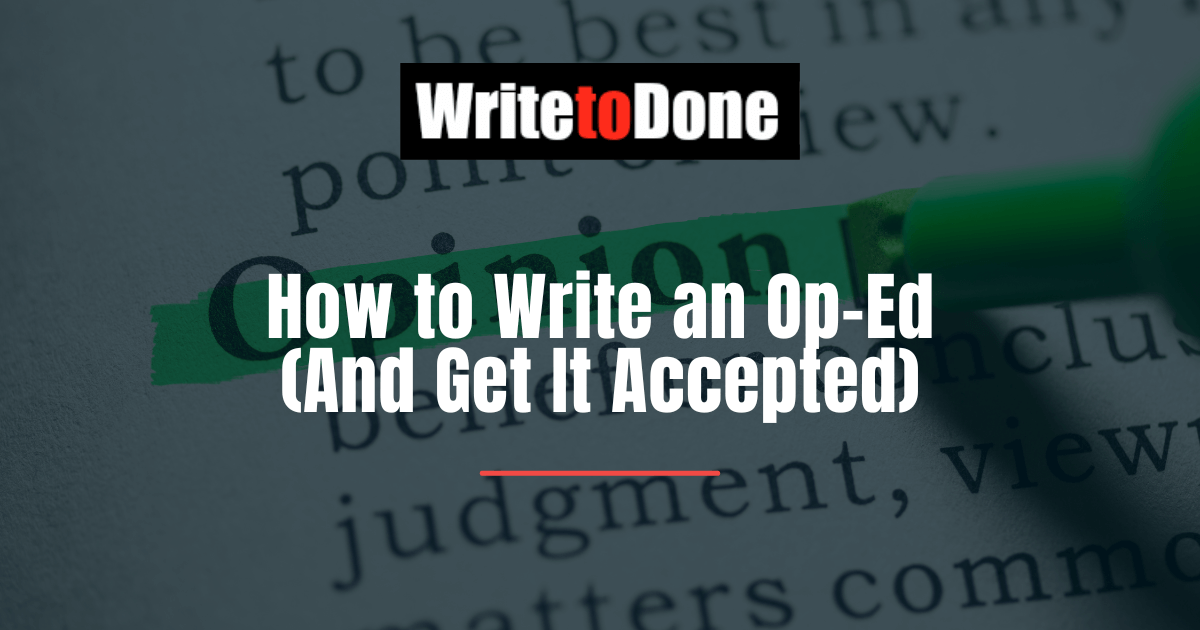Ready to learn how to write an op-ed?
If you have something important to say on your blog on any hot or controversial topic, one of the best ways to gain credible visibility and recognition for your ideas is to develop a strongly focused opinion piece, known in the newspaper trade as an “op-ed.”
Easier said than done.
Your fiery opinion, supported by facts, can make your case. An op-ed is not an essay, something that unrolls slowly like a carpet, building momentum to some point or conclusion. It is the opposite.
In an op-ed for either your blog or as a guest editorial in a newspaper, the rules are the same: You essentially state your conclusion first.
You make your strongest point up front, and then spend the rest of the op-ed making your argument, back-filling with the facts.
Done right, it is persuasive writing at its best.
By tackling an important topic of the day, you will be reaching not only your regular readers but also perhaps an elite audience of opinion-makers.
Op-Ed Checklist to Keep You on Track
- Focus tightly on one issue or idea — in your first paragraph. Be brief.
- Be timely. If your essay is responding to current events, the quicker you can write and promote it, the better. You have days, not weeks.
- Express your opinion, and then base it on factual, researched or first-hand information.
- Be controversial, but not outrageous. Be the voice of reason.
- Be personal and conversational; it can help you make your point. No one likes a stuffed shirt.
- Be humorous, provided that your topic lends itself to humor. Irony can also be effective.
- Have a clear editorial viewpoint — come down hard on one side of the issue. Don’t equivocate.
- Provide insight, understanding: educate your reader without being preachy.
- Near the end, clearly re-state your position and issue a call to action. Don’t philosophize.
- Have verve and “fire in the gut” indignation to accompany your logical analysis.
- Don’t ramble or let your op-ed unfold slowly, as in an essay.
- Use clear, powerful, direct language.
- Emphasize active verbs, forget adjectives and adverbs, which only weaken writing.
- Avoid clichés and jargon.
- Appeal to the average reader. Clarity is paramount.
- Write 750 double-spaced words or less (fewer is always better) for newspapers, but your piece can go longer for your blog. Remember, shorter is always better.
- Include a brief bio, along with your phone number, email address, and mailing address at the bottom if your article goes to a newspaper.
How to Submit Your Op-Ed
First, read up in the opinion section of the publication you’re aiming for. If the topic you’re addressing has recently been covered from the same angle/opinion, there’s a good chance yours won’t be accepted. Do you homework first to ensure that you have the best chance of getting accepted.
Most major newspapers today accept timely op-eds by email. Check the paper’s website first to be sure what its policy is. While it’s tempting to fire off your op-ed to The New York Times, remember that there are many other major newspapers to consider. The New York Times receives more op-eds daily than any other paper in the US, so competition there is fierce. It’s better to be published in another excellent paper than to be not published in The New York Times.
Here is an example of an op-ed I wrote for The Seattle Times.
John McLain is author of How to Promote Your Home Business and a novel, The Reckoning, both available at Amazon.com. His screenplay based on his novel was a finalist in the Writer’s Digest International Writing Competition. He has been a newspaper reporter on major dailies, an ad copywriter, and a magazine editor.
















